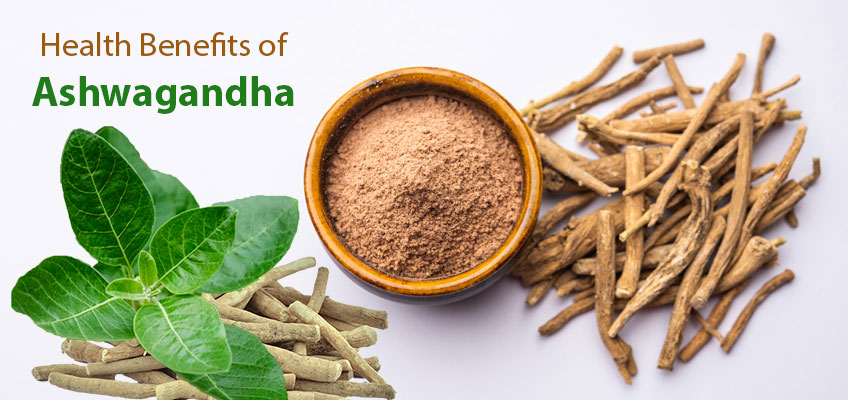
Ashwagandha is a herb whose roots and berries have been used for centuries as a tonic to treat a wide variety of ailments in traditional Indian, Ayurvedic, and Unani medicine. It is native to India, North Africa, and the Middle East, and today is cultivated in various parts of the world. Modern research has begun to recognize Ashwagandha for its anti-inflammatory and anti-tumor benefits and its role in stress relief, cancer treatment, and fighting fatigue.
A short shrub that grows to a height of 35 to 75cm, Ashwagandha bears tiny orange-red tinged fruits and belongs to the same family as the tomato plant. Also known as the winter cherry or Indian ginseng, the name Ashwagandha is derived from the Sanskrit words Ashva, meaning horse, and gandha, meaning smell. This name is in part due to the root having a strong odor when wet as well as the extract from the herb being able to impart the strength and vigor of a stallion. The root was used as a tonic, an aphrodisiac, a narcotic, and a diuretic among other uses. The leaves had used in reducing fever and painful swellings, while the seeds were used as an anthelmintic.
Ashwagandha is known as an adaptogen, which is a term used for substances such as plant extracts that help to increase the body’s ability to resist the damage caused by stress and restore homeostasis. Poor diets and environmental factors all play a role in having detrimental effects on our bodies. The antioxidant ability of Ashwagandha can be beneficial in fending off free radical damage resulting from these stresses on the body.
Antioxidant Ability
Ashwagandha is rich in flavonoids, which are antioxidants commonly found in fruits and vegetables. In one study, components of Ashwagandha were given to rats to test its effects on their brains. Researchers saw a dose-related increase in three natural antioxidants: superoxide dismutase, catalase, and glutathione peroxidase. These three antioxidants have a protective effect on neuronal tissue, and a decrease in these three result in the accumulation of toxic oxidative free radicals which lead to degenerative effects.
In another study, Ashwagandha root extract was shown to prevent an increase in lipid peroxidation in mice and rabbits. This highlights Ashwagandha’s potential role in slowing the onset of inflammatory diseases such as atherosclerosis, ischemia, liver disorders, and neural disorders.
Stress Relief
Ashwagandha was also tested for its effects on the body after being exposed to physical and environmental stress. In two separate swimming performance tests, mice were given extracts of Ashwagandha in order for researchers to determine if it would have an improvement in the swimming time of the mice. The results of the studies showed that mice that were given the extract were able to swim for twice as long a duration as their control counterparts. Researchers determined that Ashwagandha extract had an effect in reducing ascorbic acid content and weight increase of the adrenals that were normally seen during the test.
In the brain, Ashwagandha changes the configuration of neuron receptors, enabling GABA molecules to neutralize norepinephrine and adrenaline produced in the brain due to nervous tension and stress. The root also contains tryptophan which is a precursor to serotonin. In the body, serotonin is a neurotransmitter responsible for maintaining mood balance and a lack of it is responsible for depression.
Cancer Treatment
Ashwagandha extract was also tested for its effectiveness in cancer treatment. In mice and in vivo studies, the leaf extract was shown to selectively kill tumor cells by causing either growth arrest or apoptosis. Results like this were shown in bone, breast, lung, cervical, and brain tumors. One way Ashwagandha does this is by interrupting cell division and inhibiting the development of new blood vessels that would otherwise feed the cancer cells. The antioxidant properties of Ashwagandha also have been shown to provide protection against the oxidative stress produced by tumor cells and some forms of traditional cancer treatments.
Height Growth
Yes, Ashwagandha, also known as winter cherry for height, helps women grow. With a long history of utilization, Ashwagandha for height yields positive results for many. height growth is not the only positive result of this natural herb. Ashwagandha ensures the required balance of different chemicals in the body and helps in the renewal of body cells as well as increases the secretion of human growth hormone.
Ashwagandha is one of the herbs used in Growth On powder, Ashwagandha is helpful for body growth as we have discussed in the above post. So go ahead and buy growth on powder as a supplement for height gain.
Read our related blog on our Hindi website telecart.in.
Leave a Reply
You must be logged in to post a comment.